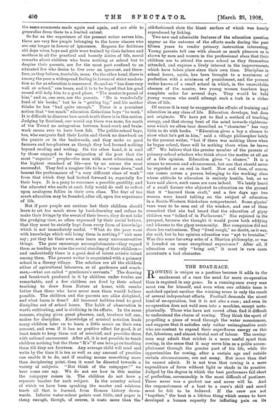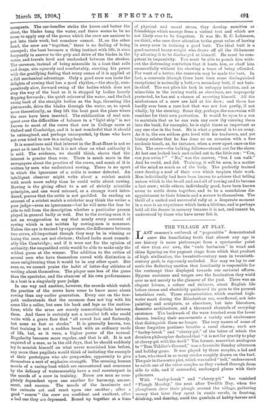THE BOAT-RACE.
ROWING is unique as a pastime because it adds to the excitement of a race the need for more co-operation than is required in any game. In a running-race every man must run for himself, and even when one athletic team is matched against another the winning score is only the result of several independent efforts. Football demands the nicest kind of co-operation, but it is not also a race ; and even its co-operation does not weld men into a machine, except meta- phorically. Those who have not rowed often find it difficult to understand the charm of rowing. They think the sport of propelling a piece of wood through the water monotonous, and suppose that it satisfies only rather unimaginative souls who are content to expend their superfluous energy on this flat, laborious, and almost brutal sort of labour. The rowing- man may admit that cricket is a more useful sport than rowing, in the sense that it may serve him as a polite accom- plishment through the greater part of his life, while the opportunities for rowing, after a certain age and outside certain circumstances, are not many. But more than that he cannot admit. It is not true that rowing is a mere expenditure of force without light or shade in its practice. Judged by the degree in which the best performers fall short of perfection, oarsmanship is the most difficult of pastimes. There never was a perfect oar and never will be. And the responsiveness of a boat to a crew's skill and mood must be felt to be believed. If the crew are not "together," the boat is a lifeless thing which seems to have developed a human capacity for inflicting pain on its occurients.. The oar-handles strike the knees and batter the chest, the blades bang the water, and there seems to be no room to apply any of the power which the crew are anxious to put 'into their work, but somehow cannot. If, on the other hand, the crew are "together," there is no feeling of being cramped ; the boat becomes a thing instinct with life, it rises buoyantly in answer to the grip and drive of the blades in the water, and travels level and unchecked between the strokes. The oarsman, instead ef being miserable in a boat that rolls and drags, sits squarely and comfortably, exerting his power with the gratifying feeling that every ounce of it is applied at a full mechanical advantage. Only a good crew can taste the delights of rowing that has a good rhythm,—the steady, com- paratively slow, forward swing of the bodies which does not stop the way of the boat as it is stopped by bodies loosely flopping forwards ; the quick seizure-of the water, and the fast swing back of the straight bodies as the legs, thrusting like piston-rods, drive the blades through the water, or, to speak more theoretically, as they lift the boat past the place where the oars have been inserted. The exhilaration of real con- quest over the difficulties of balance in a "light ship" is not known to most of the crews that row in College races at Oxford and Cambridge, and it is not wonderful that it should be unimagined, and perhaps unsuspected, by those who have not even tried to row in a racing-boat.
It is sometimes said that interest in the Boat-Race is not so great as it used to be, but it is not clear on what authority it is said. The evidence, we should think, shows that the interest is greater than ever. There is much more in the newspapers about the practice of the crews, and much of it is written by men who understand rowing. There is no sport in which the ignorance of a critic is sooner detected. An intelligent observer might write about a cricket match with much more safety than he could write about rowing. Rowing is the giving effect to a set of strictly scientific principles, and one word misused, or a strange word intro- duced, proves- that the critic is not qualified. In reading an account of a cricket match a cricketer may think the writer a poor judge—even an ignoramus—but he will none the less be able to tell from the description whether a particular person played in general badly or well. But to the rowing-man it is not an exaggeration to say that nearly every account of rowing which is not written by rowing-men is nonsense. Unless the eye is trained by experience, the differences between two crews, all-important though they may be in winning or losing the race, are not obvious ; Oxford looks most remark- ably like Cambridge ; and if it were not for the opinion of authority, the unqualified critic would be able to make only the wildest guess at the winner. The addition to the critics of several men who have themselves rowed with distinction is more enlightening than it would be in any other sport. But even so, we cannot praise the habit of latter-day athletes of writing about themselves. The player sees less of the game than the spectator, and the observer of his own performances in a boat is a singularly poor judge.
In one way and another, however, the crowds which watch the practice of the crews have come to know more about rowing than any earlier generation. Every one on the tow- path understands that the oarsman does not tug with his arms like a sailor, but uses his back and legs as the motive- force, while the arms are merely connecting-links between them. And there is certainly not a novelist left who could write with a grave face that "all rowed fast and furiously, but none so fast as stroke." It is generally known, too, that training is not a sudden break with an ordinary mode of life, but, as it were, a higher power of the normal. Regularity becomes more regular, and that is all. It is not required of a man, as in the old days, that he should suddenly try to nourish himself on what never nourished him before, any more than pugilists would think of imitating the example of their -prototypes who ate gunpowder, apparently to give themselves a sort of explosive strength. The seeming human moods of a racing-boat which are encountered and overcome by the delicacy of watermanship have a real counterpart in the moods- of a crew in training. Never are men so com- pletely dependent upon one another for harmony, amuse- ment, and success. The moods of the inanimate and the animate act and react upon one another ; after a good " course " the crew are confident and exultant, after a bad one they are depressed. Boxed up together at a time
of physical and moral stress, they develop enmities oi friendships which emerge from a violent test and which are not likely ever to be forgotten. It was Mr. R. C. Lehmann, we think, who once drew attention to the great value of having in every crew in training a good butt. The ideal butt is a good-natured heavy-weight who draws off all the ill-humour by allowing it to be discharged at himself. He must be com- petent in impassivity. You must be able to punch him with- out the distressing conviction that it hurts him, or chaff Lim unmercifully without his showing a trace of being offended. For want of a better, the coxswain may be made the butt. In fact, a coxswain (though there have been some distinguished exceptions) is naturally a butt,—a secondary butt, if not butt- in-chief. The cox plies his task in unhappy isolation, and as minorities in the rowing world, as elsewhere, are improperly protected, he has not a chance of asserting himself. All the misfortunes of a crew are laid at his door ; and there has hardly ever been a race lost that was not lost partly, if not wholly, by the steering. Some day, perhaps, the coxswains will combine for their own protection. It would be open to a cox to maintain that as he can ruin any crew (by running them into the bank, for example), he is eight times as important as any one else in the boat. He is what a general is to an army. As it is, the cox seldom gets level with his traducers, and yet history relates that he has done so on occasion with a fine sardonic touch, as, for instance, when a crew upset once on the Isis. The crew—the hulking fellows—struck out for the shore. At last one looked back and called out to the little cox: "Cox, can you swim ? " "No," was the answer, "but I can walk." And he could, and did. • Training, it will be seen, is a matter of the mind as much as of the body. The perfectly trained crew develop a soul of their own which inspires their work. Men individually bad have been known to achieve that telling unison which is the be-all and end-all of rowing and to become a fast crew ; while others, individually good, have been known never to settle down together, and to be a scandalous dis- appointment to their friends and a sorrow to themselves. The thrill of a united and successful rally at a desperate moment in a race is an experience which lasts a lifetime, and is perhaps held all the dearer in memory because it is not, and cannot be, understood by those who have never felt it











































 Previous page
Previous page